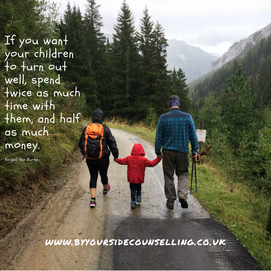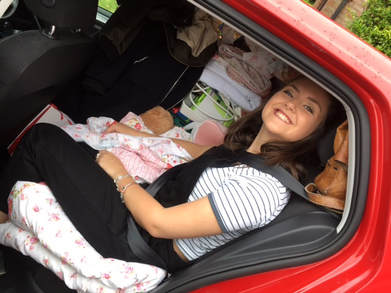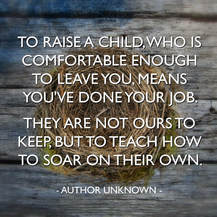|
Being a parent is hard. It can feel harder today being a parent than with previous generations. We now have 24 hours a day news cycles, we’re bombarded by images of perfection and surrounded by social media where every waking move is recorded for likes and approval. School is no longer the local one round the corner; we look at results, league tables and achievements. There is pressure for our children to achieve academically (slowly vocational qualifications and experiences are making a come back). There is pressure every which way we look - if we feel like this as an adult, how must our children feel? Gone are the days when we could shut the door on the world and switch off in the safety of our own homes. We just want to protect our children, no matter how old they are - but is this right? Being a parent is hard; being a parent of teenagers, that certainly isn’t easy. When they were little we knew exactly where they were, knew what they were eating, helped them to explore the world safely, knew who their friends were and guided them through. As they started to grow we encouraged them to explore their emotions and home. We helped them to start to think for themselves and they in return pushed the boundaries we set. Through exploring they began to realise what was okay and not okay. As they set off for school there was a hope that in their very early years we had done enough and given them solid foundations of love, security and trust that they were secure enough to go out into the world of education. During the early primary years our children kept revisiting the early lessons and learned what worked and didn’t work for them as individuals and in which environment. They also learned new skills; what is socially acceptable behaviour, where they fit in the world of others outside of the family whilst learning about the world and themselves and the differences there are. Our children then move into the second part of primary education. Here the building blocks for learning, growing and developing continue. They learn about how to identify with their own sex, develop responsibility for themselves and that of others, continue to learn about rules and structures and the relevance of these and develop skills to help them learn from their mistakes and also decide to be good enough, whilst revisiting the early developmental goals. Our children are now moving into adolescence. This is accompanied with a move to secondary education, often leaving the safety and security of a smaller environment which might have focused on nurture as well as education. Add into the mix hormones and we are now living with a teenager. Living with a teenager During this stage our teenagers revisit the developmental tasks outlined above, but from the new position of working towards independence whilst safe in the knowledge that we have their back. Sexuality is explored and they learn who they are, which is ok and indeed healthy. They move towards becoming a separate, independent person with their own identity and values. Someone who is responsible for their own needs, feelings and behaviours, but is able to ask for support when needed. So what can we as parents do? Our role is to empower our children to grow and develop into young independent adults who are competent and confident to go out into the world and live their best life. We don’t have to be perfect as parents, to be fair, we don’t have to be perfect human beings, we just need to be good enough. We will make mistakes, but we need to own these and admit that we got it wrong - after all our children learn so much from what they see and hear. We need to let our developing young adults know we trust them to make the right choices, and even if they don’t, we will be there for them, to support and guide them, without judgement. None of us want or like to hear the words “I told you so”, so why would our teenagers? We need to remember our own teenage journeys (sometimes that is what terrifies us) but we also learned from our mistakes, we grew and developed into the people we are today. The teenage journey feels so much more difficult today than that of previous generations. Mental health issues for young people is at an all time high. However this generation are more open to exploring and expressing themselves, this is a good thing. It can be difficult to address issues ‘which weren’t around in my day’. However, they probably were but no one talked about them. Depression, self harm, sexuality and gender weren’t openly talked about. They existed but were hidden due to stigma and shame. We should be celebrating that our children are confident enough to discuss these topics openly. They may not discuss them with us, their parents, due to fear, embarrassment, feeling that they’ve let us down or that we will judge them. They do want to talk with you, but without these caveats. What else can I do? Perhaps start a conversation, ask them how they feel about things, don’t put forward your opinions, just listen and hear what they are saying. We all know and relish what it’s like to feel heard and listened too, often we don’t want advice or be told we’re wrong or what we’re doing is just a phase; we want to be acknowledged for who and what we are. Our teenagers want this too. Note to self... Nobody said this was going to be easy. Take time to celebrate your successes and time to reflect on how you could have done things differently. This is a journey for each and every one of us, no one has all the answers, but hopefully this will empower you to feel you’re good enough. If you feel that you or your teenager could benefit from talking with someone, why not get in touch. Click on the button below. This website uses marketing and tracking technologies. Opting out of this will opt you out of all cookies, except for those needed to run the website. Note that some products may not work as well without tracking cookies. Opt Out of Cookies
0 Comments
 Summer holiday survival You’ve managed to sort out the childcare headache for the summer holidays, congratulations this in itself is no mean feat. Here’s to enjoying six weeks of carefree days, sun, sea and… screaming kids. I remember it well the anticipation of sharing precious time with my 2 girls and yet there were some days when I couldn’t wait for school to be back. Does this make me a bad mum? No, it makes me human! I was fortunate enough to raise the girls before social media took over our lives; before everyone posted what a fantastic time they were having together, pictures of what they were eating, where they were staying - what we need to remember that it is just a snapshot, one moment in a 24 hour period that might not actually be anything like the photo posted on instagram would have you believe. Often as parents, and as individuals, we feel that we are not good enough, that we are bad parents/people and that everyone else has got is sussed. Truth is, you’re not and they haven’t! There is no real rule book on how to be a good parent, we’re all just winging it. Some days are better than others, but we are all just trying to be the best parent we can be today. If you’re struggling how to entertain the kids for the remaining few weeks why not give some of these a go, they don’t have to cost a lot of money, so what’s not to like? 1. Turn off from social media Challenge the family (this includes the adults) to have a morning/afternoon/day free from social media/internet. We as parents need to set an example, all too often we miss what is going on around us and not live in the moment because we’re so wrapped up in seeing what everyone else is up to. We miss seeing, exploring and experiencing life as it happens. We don’t need to take 20 photos or videos and post them to prove we’re having a good time, we can just live it! 2. Board... games The sun has gone into hiding, now what? Why not search through all the board games, packs of cards, lego, puzzles, colouring books and pens. Each one of you choose a game and spend the day getting lost in the competition, closeness, rules of turn taking, laughing together as a family. I often used this opportunity to realise which games the girls had grown out of, or maybe giving them an opportunity to simply play again, as all to often they want to be racing ahead onto the next stage. (No console/phone in sight) 3. Making dens Using a bed sheet/duvet cover, blankets and pillows, not forgetting a bucket full of pegs, why not make a den together? We’d peg the sheets to a couple of chairs, or use the sofa cushions to hold the sheet in place and make a tent. This often ended up sparking their imaginations; we became pirates and used cushion on the floor as stepping stones to get from one side of the room to the other without being eaten by crocodiles! As a reward we’d have a picnic in our den - usually some fruit chopped up and a glass of squash. 4. Movie memories Movie/duvet days are also great fun. Snuggle up under the duvet together and watch a movie. The kids will love the fact that you’re there with them, these are the precious memories that will be remembered. The chores can wait, and it’s far cheaper than going to the cinema. 5. Fresh air Take the kids out, even if it’s raining! This doesn’t mean paying a fortune. Walk around the area where you live, go to the beach/woods/park. Kick a ball around together, jump in puddles. Get them to pick up twigs, leaves, feathers and then when you get home use these treasures to make a picture of your outing. You don’t need glitter and paint, nature has provided you with all you need, that and some encouragement and imagination. 6. Unleash the artist When the sun does come back out, there’s always chalk drawings on pavements (the rain will soon wash them away again) or using an old paintbrush and some water, ‘paint’ a picture onto the path before the sun dries it up. 7. And... bake! Bake with the kids. It doesn’t have to feature on the Great British Bake-off or Masterchef, but the skills, time and concentration needed to weigh, measure, mix, stir, laugh, get covered in flour - obviously optional - along with the fun, laughs and connection with each other will be remembered for a long time. It’s ok for your children to be bored, you’re not there to entertain them all day, every day. When children become bored, and with a little bit of direction they begin to use their imaginations, to create, explore and discover - all of which are precious life skills. I’m not Mary Poppins, nor do I profess to be the best mum around, or know all the answers. However, I do remember some of the cheap, easy and fun things we did together. It’s about quality time together and reminding yourself you’re doing an ok job and that you are good enough. If you have any other tips, why not share them below in the comments. I recognise and acknowledge that empty nest is not just a phenomenon experienced by parents whose child is leaving and moving to university.
After the warmth of the summer holidays, receiving exam results and finalising choices for the future, September brings with it new beginnings and transitions. Over the next few weeks there will be countless streams of cars crammed full of bedding, crockery, pots and pans and other items from home, taking to the roads and transporting their children and possessions either back to, or to university for the first time. If you're really lucky and have left behind the extra items that might come in handy, there's just enough room for your child and yourselves to be shoehorned in too! Excitement, trepidation, anxiety are crammed in the car too, both for the young adult embarking on their new journey, and parents alike, a vehicle full of mixed emotions. Having safely left your child in their accommodation, and usually wiping away a few (or a lot of) tears the journey back home begins. What now? Who am I? What should I do? I'll miss them... These and so many more questions and emotions fill the spaces where the bedding, pots and pans sat. After we'd dropped off both our daughters at uni all these questions bombarded us, I realised that this was what they meant by empty nest. The girls are now in years 2 and 3 of uni, but this hits me each year, who am I now that both the girls have moved on to their next adventure in life? Up until now I knew I was mum; dependable, always there, teaching/nagging, supporting and loving both the girls unconditionally. This has not changed, however as time has moved on I realise that our relationships with one another has. They are now independent (most of the time - we still get the odd text asking how to defrost or cook an item, or is it ok to wash/tumble dry a specific item of clothing) they make their own choices and decisions - as it should be. Both have partners who are their go-to person and that is fantastic, however as a mum it has taken me a while (and I still am) adjusting to the change in our relationship, especially if they are going through a difficult time and all you can do is be there for them, no longer being able to just make it all better. It'll never be how it was, it is different, still positive, beautiful, the best job in the world, just different. I tried to find and read numerous articles so I felt less alone in this new role and how I was feeling. Some were helpful, some not so, some even seemed to ridicule how I was feeling - there were undertones of 'pull yourself together' - or perhaps that was just my sensitivities. Now that I am getting used to how things are I found that working through some of these 'tips' can be helpful, they might help you too: Keep in touch - Even though your child has moved away you can still keep in contact via phone calls, emails, texts or video chats. However, they are trying to build new friendships and support networks so they need time and space too! Arrange to visit - and be prepared that this usually entails filling the fridge and taking them out for something decent to eat, but nevertheless it's still quality time! Talk to someone - If you're finding it difficult adjusting to having an empty nest talk to loved ones, your partner will possibly be experiencing something similar (whether their emotions and feelings are the same or different - just as we are all individuals we all experience things differently, neither is right or wrong) or friends in a similar situation - they'll understand. Share how you are feeling, it's normal to feel sad, lonely and lost (or excited and happy), whatever you're feeling is ok. If you start to experience a low mood or feel depressed, consult your GP or seek counselling. It's ok to feel positive - You now no longer have a young adult asking for your undivided attention at all hours of the day and night. Using the extra time and energy you now might have, you could invest it in some personal interests or hobbies you have had on the back burner, or focus on getting to know who you are now. Some individuals nurture their relationship with their partner, that might have been put on hold, and explore the delights of being together and 'child-free'. Whatever you choose to do might help you adapt to this major life change. Give yourself time - Most importantly, give yourself time to adjust and accept this new phase in your own and your child's lives; acceptance to be with the ‘not knowing’, accepting and trusting this new process and truly learning to let go. There will be a mix of emotions. Focus on what you can do to help your child succeed they do leave home. Feel proud that you have enabled this young adult to grow and mature into an independent person.  Miscarriage, unfortunately still remains something of a taboo subject. Women who have suffered a loss of pregnancy can feel embarrassed and isolated. The aim of this blog is to help get information out relating to the feelings associated with losing a baby, and provide a go to place for individuals, and their families and friends who want to sensitively support them at this time. Losing a baby due to early miscarriage is devastating. It is not just the physical loss, but the loss of hopes and dreams for the future. Everyone’s experience of pregnancy loss is unique. It is normal to feel a vast range of emotions, and there is no right or wrong way to express your grief and loss, these will vary and be dependent on your own circumstances. Your way may also be different from how your partner expresses their loss. They may be trying to protect your feelings and emotions by not sharing their own feelings, neither is right or wrong. Some people find it very difficult to know what to say, especially if your miscarriage is early in pregnancy. This can add to your feelings of loneliness or isolation. Others may end up saying the wrong things, even though they were well meaning. Some may be fearful that they might upset you so choose to say nothing. Whichever way people speak with you, these responses can be hurtful; some people just don't understand what your loss means to you and your partner. The Miscarriage Association have launched a campaign ‘Simply Say’ highlighting what might be helpful to #say/#dontsay. Their message is; ultimately each individual is different, listen to them and be guided by what they are needing. Often individuals find talking about their loss can help. They may find that people can be supportive and understanding. Some may share their own experiences helping reduce the feelings of being alone. There are support groups available, however this is not for everyone, and some women and/or their partners find talking with a counsellor as a couple or on a one-to-one basis can be helpful. I can be that person for you to talk to, why not click on the link below and get in touch. The Miscarriage Association offers a range of online support. www.miscarriageassociation.org.uk. |
AuthorI am a counsellor who wants to empower individuals to be the best version of themselves. Archives
October 2020
Categories
All
|





 RSS Feed
RSS Feed